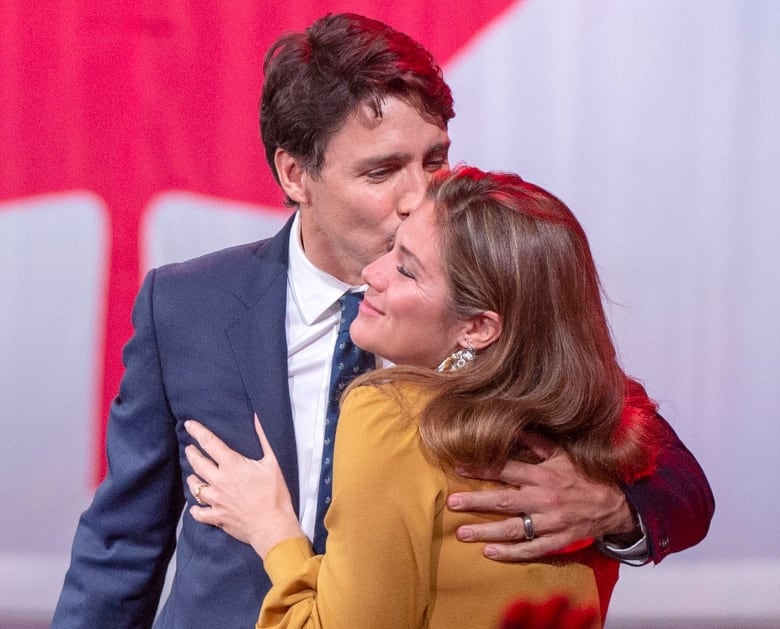
This article is more than
5 year oldPrime Minister Justin Trudeau says the federal government will warn Canadians against all international travel and is considering tightening the border to some international travellers.
During an interview with Radio-Canada's Montreal morning show on Friday, Trudeau said the government is not closing the door to any idea and is assessing the situation on a day-to-day basis.
Asked if the government will close the Canadian border, Trudeau said: "We are in the midst of looking at this."
"We're in the midst of evaluating day-to-day what to do," he said.
"As you've seen, there are recommendations not to travel outside of Canada. We're in the midst of co-ordinating with the Americans, obviously, on our borders, on our actions. We'll continue to evaluate what we can do and how we can keep Canadians in security and we won't close the door on any idea."
Trudeau is expected to speak live this hour. CBCNews.ca is carrying special coverage live in the video player above.
Canada's Chief Public Health Officer Theresa Tam confirmed that Canada is now advising against all international travel to limit the spread of the virus. She warned that travellers could be subject to another country's travel or quarantine restrictions, and if they become sick, could be in a health care system that is inferior to Canada's system.
During that news conference, ministers announced a series of new measures to limit the spread of COVID-19:
U.S. President Donald Trump announced Wednesday evening that the U.S. was banning travellers from most parts of Europe, the same day the World Health Organization declared the global outbreak a pandemic.
The State Department also issued a global health advisory cautioning U.S. citizens to "reconsider travel abroad" due to COVID-19.
There are now 160 presumed or confirmed cases of COVID-19 in Canada. Trudeau is in self-isolation at home because his wife, Sophie, has tested positive.
Trudeau said the government is also considering income-support measures to ensure people aren't worried about money when concerned about their own health and the health of their loved ones.
"We're going to be putting in place measures to support people to make sure that they can make ends meet, that they can focus on their families while we're going through a very difficult time economically," Trudeau told Matt Galloway, host of CBC Radio's The Current, earlier Friday.
On the border, Trudeau said steps that have been taken to date have "worked quite well" in limiting the number of cases; additional measures may now be required.
"We seem to be approaching a different phase right now and we will make sure that we follow all the advice of our very top experts," he said.
Trudeau will address the nation today from self-isolation as the number of Canadians who have tested positive for the novel coronoavirus continues to grow — including his wife, Sophie Grégoire Trudeau.
His speech comes as Parliamentarians decide whether to take the unprecedented move of suspending Parliament because of the COVID-19 pandemic.
MPs voted this morning to temporarily close the House of Commons and postpone the release of the federal budget over concerns about the spreading COVID-19 pandemic.
All parties agreed to a motion adjourning the House of Commons until at least April 20. That suspension can be extended as needed. The measure effectively wipes two sitting weeks from the calendar, since MPs already had planned to be away next week and for another two weeks in April.
The motion also passed the bill to implement the Canada-United States-Mexico Agreement on trade (CUSMA), or NAFTA 2.0 as it is often known. The Senate voted to pass the bill this morning and it now awaits royal assent to become law.
The provinces have already made moves in a bid to slow the spread of the virus. The Ontario government has decided to shut schools and upcoming jury trials, while Alberta's chief medical officer of health is recommending cancelling all public gatherings of more than 250 people.
Trudeau will also speak to provincial and territorial premiers about COVID-19 this afternoon over the phone after the first ministers meeting was cancelled.
A statement from the Prime Minister's Office late Thursday said Grégoire Trudeau's symptoms remain mild and the prime minister shows no symptoms, but he'll remain in isolation for two weeks to be safe.
On The Current, Trudeau confirmed he is still showing no symptoms of the virus and has been working from home speaking with cabinet ministers and other world leaders. His wife is following the advice of doctors to get lots of rest and drink plenty of fluids, he said.

As of early Friday morning, provinces in Canada were reporting almost 160 presumptive and confirmed cases.
On Wednesday, federal Health Minister Patty Hajdu said experts suggested the coronavirus could infect 30 to 70 per cent of the population. The World Health Organization (WHO) has formally declared the outbreak a pandemic.
The government issued a wide-ranging tender Thursday asking suppliers for products and services to fight the outbreak. Ottawa says it needs things like disposable surgical masks, gowns, hand sanitizer and nitrile gloves.
It's also looking to hire more nurses and security guards.
With files from the CBC's Catherine Cullen, Catharine Tunney and The Canadian Press